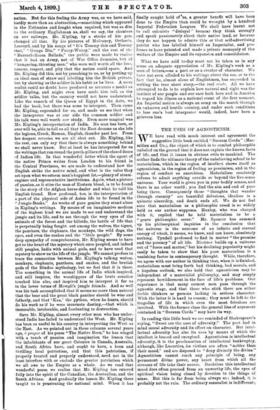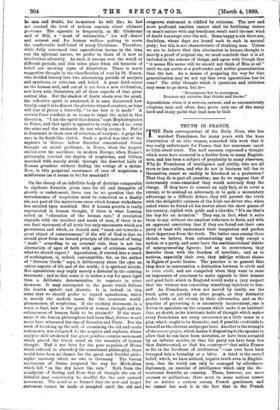THE USES OF AGNOSTICISM.
WE have read with much interest and agreement the suggestive little book entitled " Surma' Corda " (Mac- millan and Co.), the object of which is to combat philosophic unbelief on the ground that it does not explain the known facts of life, and that it issues in obvious evils to mankind. The author finds the ultimate theory of the unbelieving school to be materialism, which in the region of intellect shows itself as agnosticism, in the region of feeling as pessimism, and in the region of conduct as anarchism. Materialism resolutely refuses to admit anything outside or beyond the five-sense universe. Your world is given you in your bodily senses, and there is no other world ; you find the aim and end of your being there. Consequently those "thoughts that wander through eternity" are beautiful delusions, idealism is a quixotic absurdity, and death ends all. We do not feel sure that materialism as a philosophic creed is so widely held as our author supposes. Huxley, who was charged with it, replied that he held materialism to be a I" grave philosophic error." Mr. Spencer has summed I up his philosophical inquiries in the conclusion that the universe is the outcome of an infinite and eternal energy of which, it seems, we know, and can know, absolutely , nothing. Tyndall professed to find in matter "the promise ' and the potency" of all life. Buchner builds up a, universe , out of "force and matter," but his declining popularity might ' easily be taken to show that his pure materialism is a I vanishing factor in contemporary thought. While, therefore,
we agree with our author in thinking that, when it is finished, • materialism must bring forth bad thinking, bad morals, and a hopeless outlook, we also hold that agnosticism may be independent of a materialist philosophy, and may simply represent bewilderment in the face of life's problems. Our experience is that many earnest men pass through the agnostic stage, and that those who stick there are either feeble thinkers or persons lacking in serious character. With the latter it is hard to reason ; they must be left to the tragedies of life in which even the most frivolous are involved. With the former class the general line of argument contained in " Sursum Corda " may have its way.
In reading this little book we are reminded of Shakespeare's saying, "Sweet are the uses of adversity." The poet had in mind moral adversity and its effect on character. But intel- lectual adversity has also its uses by means of which the intellect is braced and energised. Agnosticism is intellectual adversity, it is the proclamation of intellectual bankruptcy, although, like Lucretius, its victims are often "nobler than their mood," and are disposed to "deny divinely the divine." Agnosticism cannot reach any principle of being, any permanent divine power, any heart from which all the streams of life take their source. Doubtless this intellectual mood does often proceed from an unworthy life, the eyes of spiritual vision being closed by devotion to the things of sense. But this is far from being always so ; indeed, it is probably not the rule. The ordinary sensualist is indifferent ;
he eats and drinks, for to-morrow he will die ; he has not reached the level of serious concern about ultimate problems. The agnostic is frequently,, as Mr. Gladstone said of Mill, a "saint of rationalism," his self. denial and earnest zeal for human welfare putting to scorn the comfortable half-belief of many Christians. Therefore, while fully convinced that agnosticism harms in the long run the spiritual nature, we prefer to think of it now as intellectual adversity. As such, it sweeps over the world at different periods, and this takes place when old formulaa of belief are showing signs of dissolution. There is much suggestive thought in the classification of eras by St. Simon, who divided history into two alternating periods of analysis and synthesis, or criticism and belief. A great faith seizes on the human soul, and out of it are born a new civilisation, new laws, arts, literatures, all of them aspects of that great central idea. But the shadow of doubt steals over the mind, the reflective spirit is awakened, it is soon discovered how fatally easy it is to dissect the glorious winged creature, as boys will tear in pieces a butterfly, " to see how it is made." A certain force resident in us seems to impel the mind in this direction.. "I am the spirit that denies," says Mephistopheles to Faust, and that spirit is operative in every one of us ; even the saint and the anchorite do not wholly escape it. But it is dominant in these eras of criticism, of analysis; it grips the race in its death-like clutch. Such a period was that of the sophists in Greece, before Socrates concentrated Greek thought on moral problems ; in Rome, when the Augurs smiled over the sacrifices ; in modern Europe, when Hume's philosophy touched the depths of scepticism, and Gibbon marched with stately stride through the deserted halls of Roman grandeur without finding the vestige of a shrine. Now, is this perpetual recurrence of eras of scepticism a misfortune (as it seems to be) for mankind ?
On the theory of an infallible body of doctrine comparable to algebraic formulw. given once for all and incapable of growth or restatement, there can be no question that the recrudescence of scepticism must be conceived as a deadly sin, as a part of the mysterious curse which human wickedness has entailed upon mankind. •But if human growth is really represented in human thought, if there is what Leasing called an "education of the human race," if revelation expands with the intellect and needs of man, if there is no one final statement of all truth but only statements which are provisional and which, as Arnold said, "reach out towards a great object of consciousness," if the will of God is that we should grow from an inward principle of life instead of being " made " according to an external rule, then is not the alternation of ages of faith with ages of criticism exactly what we should expect ? Agnosticism, if erected into a creed of nothingness, is, indeed, contemptible; for, as the author of " Sursum Corda" says, it deliberately shuts the eyes on entire aspects of life and of the world ; it is spiritual suicide. But agnosticism may imply merely a disbelief in the existing statement ; and in. that sense it is rather a cry for more light than a deliberate determination to vegetate in utter darkness. It may correspond to the pause which follows the heart's systole and diastole. It is, indeed, in this sense that we should prefer to regard agnosticism, which is merely the modern name for the recurrent world- phenomenon of scepticism. If the existing statement, in a word, is final, how is the growth of human thought and the enlargement of human faith to be attained ? If the state- ment of the Ionian philosophers had been final, Greece would never have witnessed the rise of Socrates and Plato. For the work of breaking up the soil, of examining the old and crude statements, was relegated to the sceptics and sophists, whose analytic skill awakened the great positive counter-movement which placed the Greek mind on the summits of human thought. Had it not been for the pure negation of Hume which reduced to absurdity the sensational philosophy, there would have been no chance for the great and fruitful philo- sophic recovery which we owe to Germany. The barren mechanism of Deism prepared the way for Methodism which fell "on the dry heart like rain." Both from the standpoint of feeling and from that of thought the era of disbelief may conceivably be needful for the new onward movement. The mind is so framed that the new and larger statement cannot be made or accepted until the old and outgrown statement is riddled by criticism. The new and more profound emotion cannot shed its fertilising waters. on man's nature with any beneficent result until the east wind of doubt has swept over the soil. Some happy souls there are, doubtless, whose days are bound each to each in natural piety; but this is not characteristic of thinking man. Unless we are to believe that this alternation in human thought is merely a proof of original sin, we must conclude that it is all included in the scheme of things, and agree with Clough that "it seems His newer will we should not think of Him at all" until we can arrive at a profounder and nobler generalisation than the last. As a means of preparing the way for that generalisation may we not say that even agnosticism has its uses ? The older thought which it questions and criticises may seem to go down, but it- " Decomposes but to recompose, Becomes my universe that thinks and knows."
Agnosticism, when it is serious, earnest, and so unconsciously religious, may, and often does, prove only one of the many hard and stony paths that lead men to God.







































 Previous page
Previous page